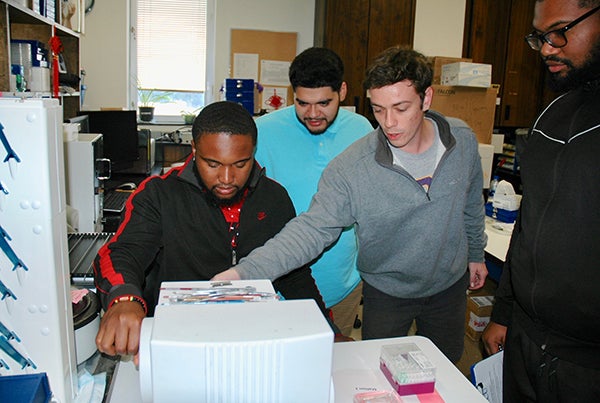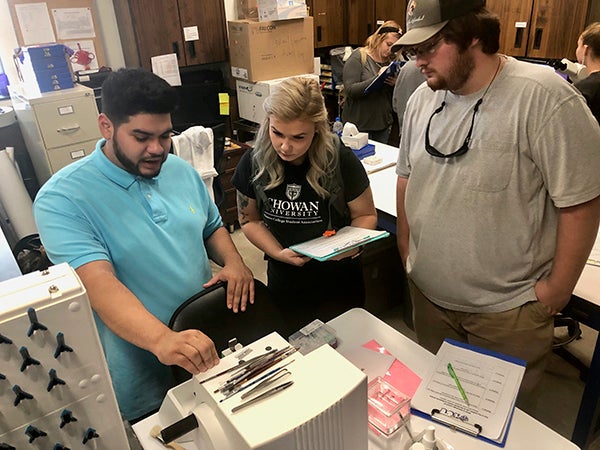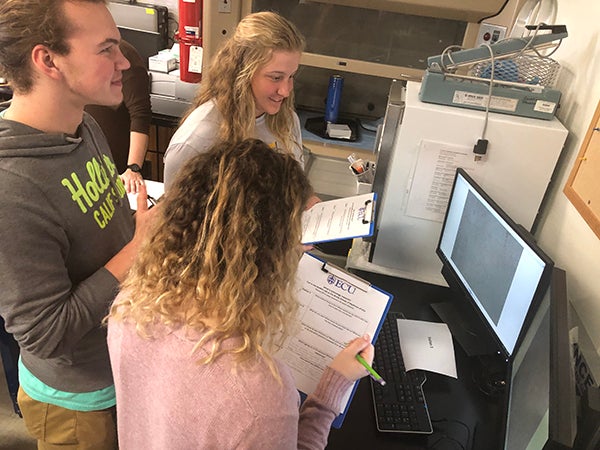ECU researcher opens her lab to students from Chowan University
A group of environmental science students from Chowan University recently spent an afternoon in an East Carolina University lab, learning from a researcher who, within the past year, has been featured by a host of national media outlets and testified before Congress – twice.
Dr. Jamie DeWitt, an associate professor in the Brody School of Medicine’s Department of Pharmacology and Toxicology, has been in the national spotlight because she is at the forefront of an international initiative seeking to gain a better scientific understanding of the human health risks of per- and poly-fluoroalkyl substances (PFAS).

ECU neuroscience students Jeff Ayala, center left, and Mark Ibrahim, center right, give students from Chowan University a tour of a lab in the Department of Pharmacology and Toxicology at ECU’s Brody School of Medicine. (Photos by Rob Spahr)
ECU alum Dr. Bo Dame is an associate professor of physical sciences at Chowan University. He mainly teaches algebra- and calculus-based physics, but because he is an ecologist by training, he also teaches coastal field ecology and environmental science.
“At a small school, you wear a lot of hats,” said Dame, who was part of the first cohort to graduate from ECU with a PhD in coastal resource management in 2005.
Chowan students who major in biology typically choose one of two concentrations – allied health or environmental – so Dame plans regular field trips, like the one to ECU, as attempt to show the students the connections across the disciplines.
“When most people come to a small biology department like ours, they want to go into medicine,” he said. “But we typically have a lot going on in the environmental field, so we want the students to get exposed to that and show them that it’s not an “either/or” – there are environmental implications to medicine.”
Because of his ECU background, Dame said he was familiar with DeWitt and her lab. So he decided to reach out to her on a whim to see if she would be willing to show the Chowan students some examples of these connections across the disciplines.
“Especially with her work in toxicology and the GenX issues, this just seemed like a perfect opportunity,” Dame said. “Most of our students are from North Carolina, so this was a chance to show them that they have these issues in their own back yard and that they have somebody an hour from campus who is an international expert in the field.”
And to Dame’s delight, DeWitt happily agreed to play host for the day.
“If I hadn’t seen labs and if I hadn’t worked in labs when I was in high school and as an undergraduate student, I would not be a university professor today,” DeWitt said. “I had academic challenges, but the lab work and the excitement that comes from the lab work inspired me to work hard to get to where I am today. So, I wanted to give other students the opportunity to see what life in a lab is all about.”

Environmental science students from Chowan University learn about toxicology in a lab at ECU’s Brody School of Medicine.
The Chowan students rotated through a series of stations that challenged them with tasks ranging from defining toxicology to looking at a liver from a mouse that had been treated with PFAS chemicals and then deducing what was wrong based on what they were shown.
“We wanted the students to get an understanding of what an average environmental toxicology laboratory does, so everything we had them do is consistent with what we do in the lab on a day-to-day basis,” DeWitt said.
The students were quizzed on what they learned during their next class and some of the information will likely be on their final exam, Dame said.
Alexis Bolam, a senior environmental biology major, said she wants to go to graduate school for marine biology after graduating from Chowan and said the visit to DeWitt’s lab was a valuable experience, even though it was something “very different” for her.
“It kind of gives an insight into what I could be doing if I did choose to stick with the fish environment,” she said. “It was nice to immerse myself into a different area where I’m able to learn more and spread out my scholastic experience rather than staying in only one specific area.”
Bolam said the students were grateful for DeWitt’s hospitality and laid-back approach toward instructing them.
“I’m from around this area, so it’s very cool to know that someone so well-known in her field is so close and is willing to bring us into her world and teach us what she does,” Bolam said. “That’s really what small-town students like us need, someone to care about them and bring them in to show them what they should be doing.”

Most of Chowan’s students are from North Carolina, ECU alum Dr. Bo Dame said, so this was a chance to give them a look at issues in their own back yard.
While Dame and the students praised DeWitt and her students for accommodating their visit, DeWitt redirected the praise back in their direction.
“Dr. Dame is a phenomenal professor for showing his students that there are many different opportunities in the world of science, environmental science and marine science that might differ from what they might have already experienced,” she said. “It’s a real testament to his dedication to his students.”
And like every good host should, DeWitt provided her visitors with warm cookies before they left.
“We had to do a little bit of work to get them here and get things set up, but they took time out of their day to come to us,” DeWitt said. “So the cookies were really a token of our gratitude for them showing up, being engaged and asking questions.
“Plus, I figured since they journeyed an hour and a half to get here, that they might need a little sugar for the road.”
-by Rob Spahr, University Communications